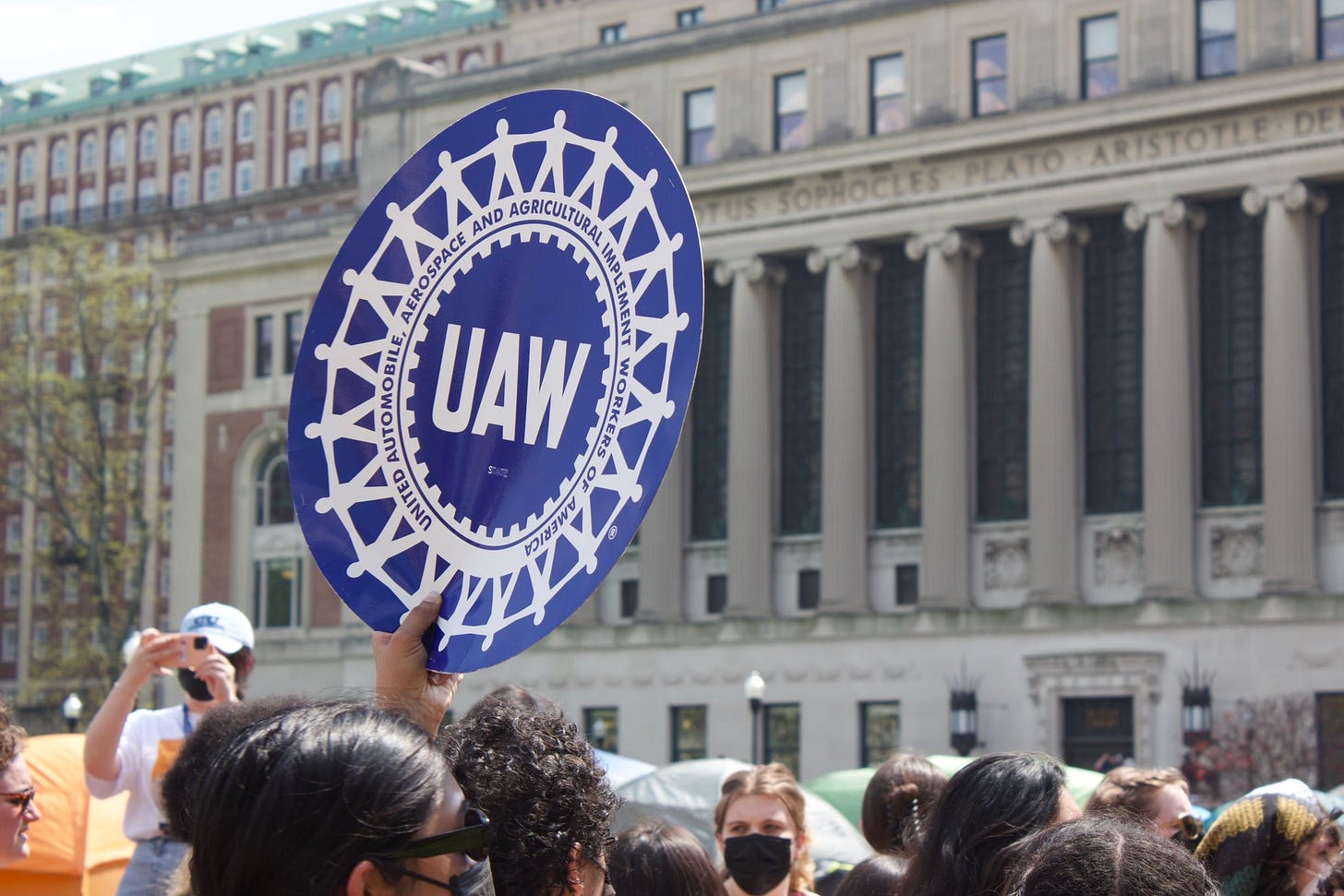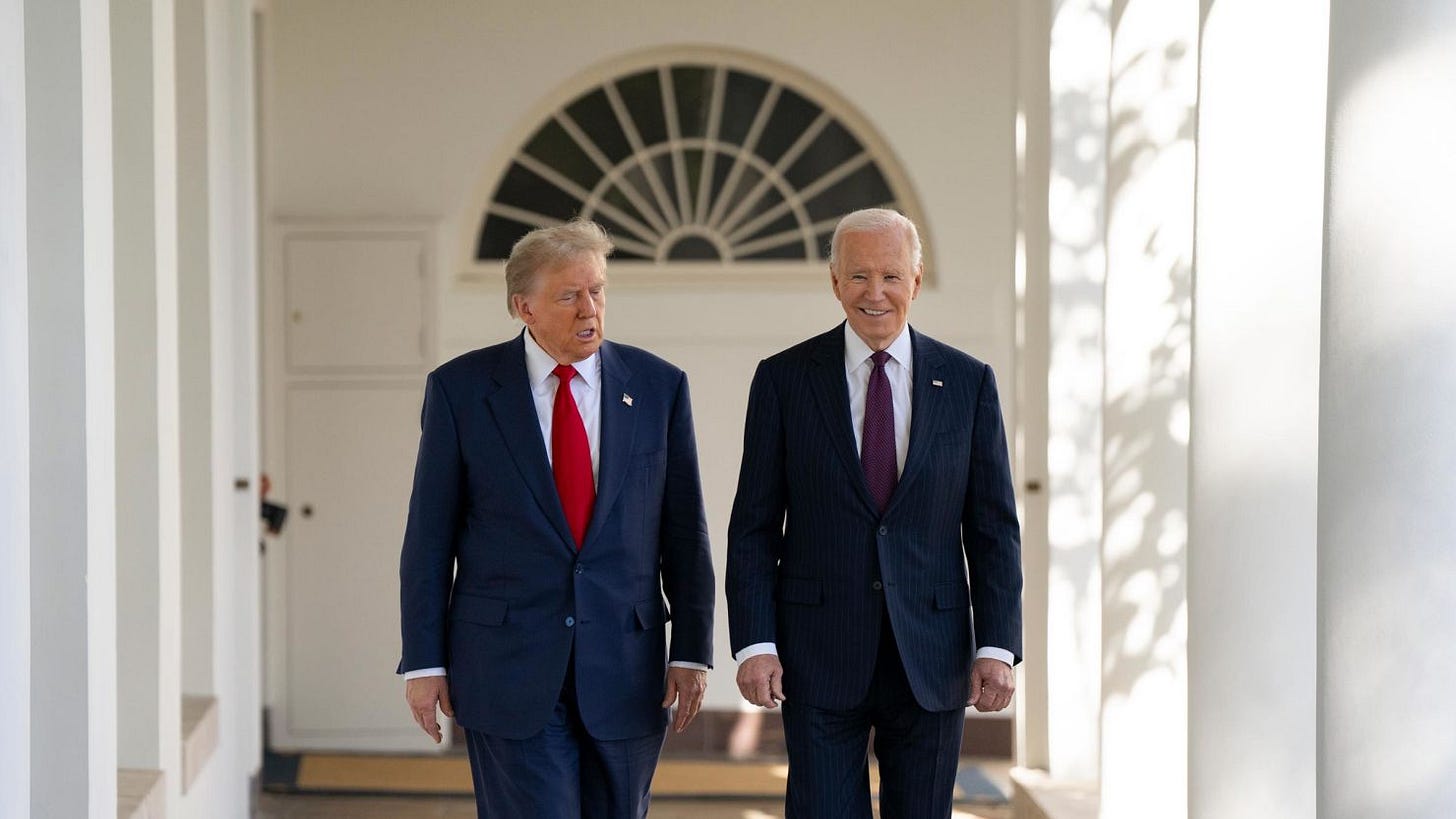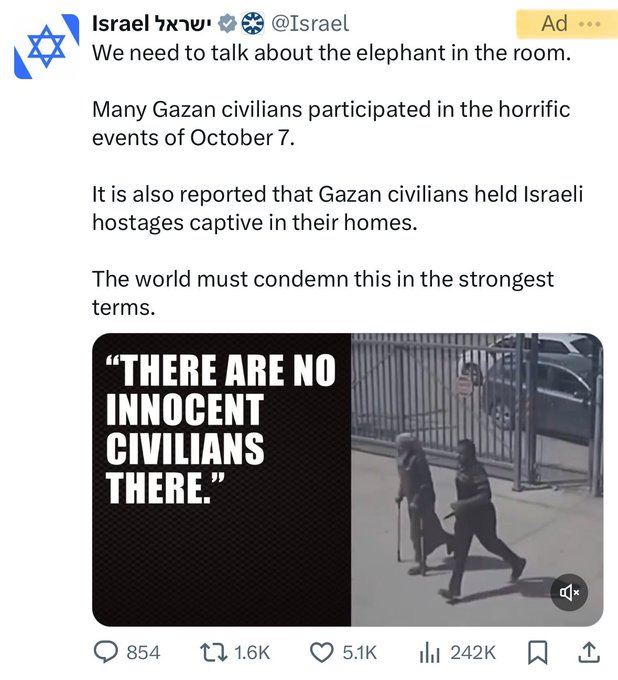US Labor and the Gaza War (1)
There is an opening not because of our own strength but because the elite is disorganized, morally bankrupt, and without vision.
In March 2024, an editor at a New York-based journal asked me to write a piece for him about the labor movement and the US-Israeli war in Gaza.1 We spoke twice on the phone about how I would approach the piece. We agreed on a framework: given that the issue is urgent, but also acknowledging that US labor cannot stop the war by electoral pressure or workplace actions, what is to be done? We also agreed that I would offer historical background drawing on my work on the Cold War.
The deadline was May 1; with permission, I filed a little bit after. Then I heard nothing until Labor Day—September 2—when the editor wrote to me “to apologize for making you wait so long for an answer to this one” (recall that the piece had been commissioned, not submitted unsolicited). He said further: “The other editors at the journal decided that your piece as written wasn't workable for the journal for various reasons, the main one being that its style of argumentation didn't quite fit the journal's house style. It has a more casual and at times polemical style than what we typically publish.” He suggested that the piece could be reworked in a different venue where “neither the substance nor the tone” would be a problem.
In subsequent emails and conversations, the editor denied that the decision to spike had anything to do with politics: neither the topic, the substance, nor the tone was at all the problem. So why was the piece killed? At one point, I was told that the problem was that it “was written with the tone of a more popular outlet — which is not a knock against it by any means!” Later, I was told that the problem was the opposite: that the piece was inaccessible to a lay reader. I was told the piece had no clear intervention, which was odd given that it concludes with a numbered list of suggestions under the heading “What Can We Do?” I was offered a kill fee (though I had agreed to write the original piece for free). The editor made clear his sincere regret that he had failed to respond for so long.
I have no way of knowing for sure why the piece was killed, and in some abstract sense I suppose it is possible it really had absolutely nothing to do with the subject matter. I have personally been guilty far more often than I would like to admit of inexcusable lapses in email-based correspondence. But the experience left me sad and confused, especially coming in the middle of an ongoing campaign of censorship and self-censorship aimed at the antiwar and Palestine solidarity movements. I had written the piece for a specific moment—the now seemingly unrecoverable moment of the mass protests, centered on but not limited to college campuses—when I had allowed myself to hope that external pressures on the Biden administration might alter US policy. By the time the piece was finally rejected without explanation, Harris was the candidate. The campus movement had been repressed out of existence. I didn’t want to rewrite the piece, since I had written at a specific moment, and for a specific audience. It would have been just as easy to write a completely new piece about the new moment—except I was too depressed by the collapse of our collective hopes that I didn’t want to do that either.
But I shared the piece with a few friends, who thought it was worthwhile and encouraged me to post it on my newsletter, whose readers are interested in labor and militarism. So I decided to post it here, in three parts since it was admittedly a bit long. This is my first draft, unedited, except for clarity or typos, which I have marked in bold.
US Labor and the Gaza War
Since early March 2020, when Bernie Sanders stopped defying gravity, it has been clear that post-neoliberalism would come to the United States—if it ever did—wrapped in the colors of national security. The Biden administration’s rejection of the Washington Consensus was announced by the National Security Advisor Jake Sullivan, not the chair of the Council of Economic Advisors, much less the Secretary of Labor or the head of the Environmental Protection Agency. The only question has been: cold war or hot? Would the return of great power competition take the form of a more-or-less friendly post-Sputnik scrimmage, or would it look more like Vietnam, or a world war?
Would the return of great power competition take the form of a friendly Sputnik scrimmage, or would it look more like Vietnam?
Up until October 7th, people who worried about this generally worried about the US-China relationship, or perhaps about Eastern Europe. In an article for Foreign Affairs that went to print on October 2, the same National Security Advisor who had announced the break with the Washington Consensus boasted that the Middle East “is quieter than it has been for decades.” Within a week, it was impossible to think about the future of the Biden administration, the Democratic Party, or the broader question of post-neoliberalism, without thinking about war–not war in general, but the violent destruction of a specific, tiny strip of land whose residents were already among the most oppressed on the planet. By early December, an expert on strategic bombing could write (in Foreign Affairs, the same journal which had just published Jake Sullivan’s worst prediction) that Israel was inflicting upon Gaza “one of the most intense civilian punishment campaigns in history.” By the time I was finishing this article, the founder of Human Rights Watch had written in the New York Review of Books that Israel was committing genocide.
Anyone who is not a sociopath has felt sickened hearing the president admit that Israel’s bombing is “indiscriminate,” while expediting shipments of ordnance that shreds human bodies, burns children alive, and leaves families to decompose under the rubble of their homes. But the problem has a special significance for the labor movement. The octogenarian who says “Bibi, I love you” is also “the most pro- union president in US history.” And the pro-union claim, though obviously made easier by the low quality of American presidents in general, is not easy to dismiss. It was undeniably dissonant to see Shawn Fain’s UAW announced support for a ceasefire only to endorse Biden shortly thereafter. But it was hard to argue that the union had nothing to lose from an open break with the White House.

It would be convenient for many people if it were possible to keep things compartmentalized. Reacting to the news that a UAW local had filed a Labor Board complaint about the university’s response to pro-Palestine protests, one figure associated for decades with the union-backed Economic Policy Institute complained: “How is that a workplace issue?” In response to someone tweeting that Shawn Fain should run for president, one labor historian—and supporter of Biden’s Gaza policy— replied: “Bad idea. Politicians have to appeal to disparate groups to win; labor leaders need to build class solidarity.” Leaving aside the specific question of who should run for president, this reply is a frank declaration that labor should conceive and present itself as a special interest rather than try to speak on behalf of the general interest–that labor should not, on principle, pursue political hegemony.
It would be convenient for many people if it were possible to keep things compartmentalized. But in the real world, the domestic and international are related.
But in the real world, the domestic and international are related, both materially and within political visions. On one side, White House aides instruct legislators that arms transfers are “good for American jobs.” On the other, international and local unions have passed resolutions calling for a ceasefire; union locals have participated in antiwar encampments; tens of thousands of UAW members voted to authorize a strike in response to the violent assault on pro-Palestine protests at UCLA.
Someone has to speak for the general interest, and whether you want to admit it or not, the people currently doing so already represent class interests (just look up all the Biden administration foreign policy figures involved in WestExec Advisors or Pine Island Capital). The need for a systematic view of the economy life, and the interrelation of foreign and domestic policies, are the central premises of both Bidenomics and Make America Great Again. In such an environment, an insistence that unions “stay in their lane” is in effect an acquiescence to elite definitions of labor’s place within society as a whole.
The question is not whether workplace and world order are connected, but how. Biden’s election year pitch is to promise the handful of surviving union steelworkers that their factories will be owned by American capitalists, not Japanese capitalists. Another approach to the same problem would be to stop supporting the war on Gaza, so that the Biden campaign would feel comfortable allowing the president to set foot in Detroit. There is no obvious sense in which the first option is a “domestic” problem and the second “foreign policy.” And it is hard to believe the first option was the best—not for the reelection campaign and certainly not for the American working class.
C. Wright Mills once complained that American labor leaders tended to think of their “movement essentially as a minority affair, which must balance its power against others, rather than as a potential majority movement with which to reorganize modern society.”
In 1948, C. Wright Mills complained that American labor leaders tended to think of their “movement essentially as a minority affair, which must balance its power against others, rather than as a potential majority movement with which to reorganize modern society.” Mills did not mean that labor leaders had no good reasons for thinking of themselves as a minority. The point of saying “potential majority” is to acknowledge that reality. But it is one thing to acknowledge that labor does not, in 1948 or 2024, possess the power of decision between alternative social futures. It is quite another to conclude that the labor movement should not develop an alternative program, which is to say an articulated sense of how our immediate next steps might connect to our principled image of the future.
It’s true that labor is a minority movement, weaker numerically than in the bleak 1920s. But we have at least one advantage over the situation Mills confronted in 1948. Social forces in general are disorganized. Biden himself had only minority support by summer 2024. His administration’s embrace of “post-neoliberalism” is an attempt at programmatism in place of the vapidity of late Clintonism. But the new vision is hardly comprehensive or reliably persuasive. Jake Sullivan is not Henry Luce, much less George Kennan. The contemporary Establishment (to the extent it still exists, in a world where the Bill Ackmans are at the throats of the Claudine Gays) has no plan, nor even a proposal, for the future of Israeli-Palestine or the future of the American university. Figures like J.D. Vance and Josh Hawley may see their power and prominence increased in a second Trump administration. But programmatically they have still not even attempted basic tasks such as reconciling their rhetorical interest in “working families” with their support for right-to-work laws.
We are a long way from the direct exercise of power. An intermediate goal, challenging is for to articulate a more attractive image of the future than the Pentagon can offer.
If there is an opening for labor to intervene in the current moment, it is not because of our own commanding strength but because the economic and political elite is disorganized, morally bankrupt, and without vision. If labor is obviously disorganized too, we are at least more organized than we used to be, which is the opposite of the case with the disintegrating Establishment. We are a long way from the direct exercise of power over national politics. An intermediate goal, challenging but achievable, is for us to articulate a more attractive image of the future than the Pentagon can offer, and to figure out how the things we are already doing might be recast as steps in the direction of that future.

In the next installment: a bit of historical perspective.
Because of my frequent criticisms of people like Michael Walzer, I should make clear that this journal was not Dissent, whose current editors have published many exemplary pieces about Gaza.

